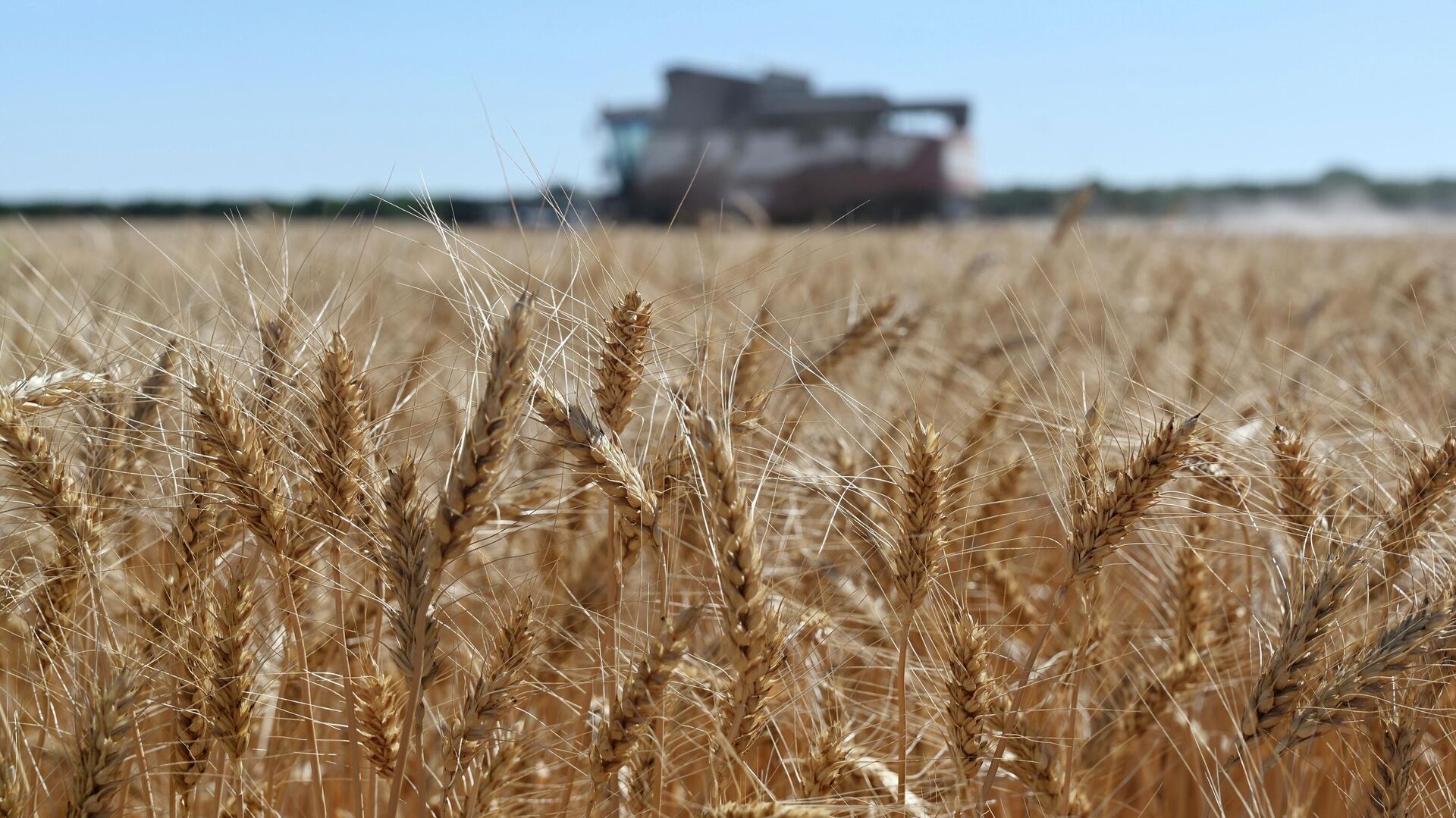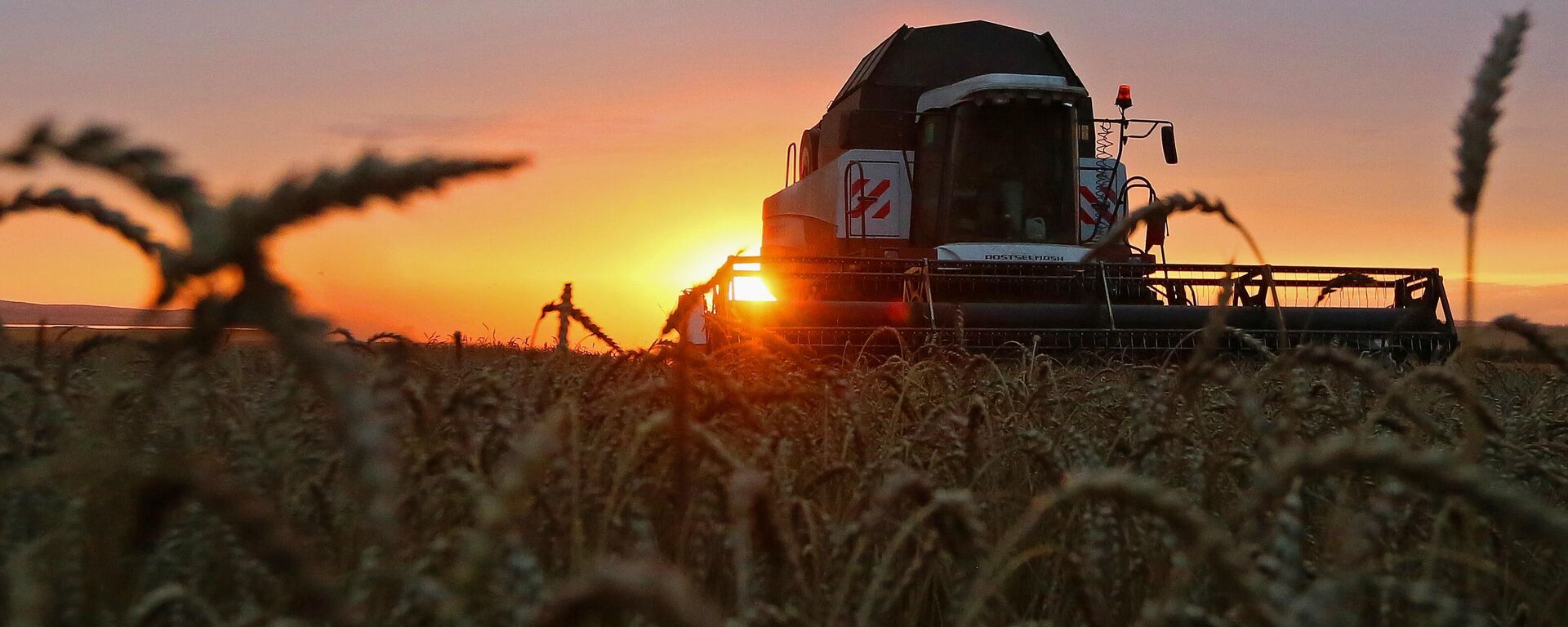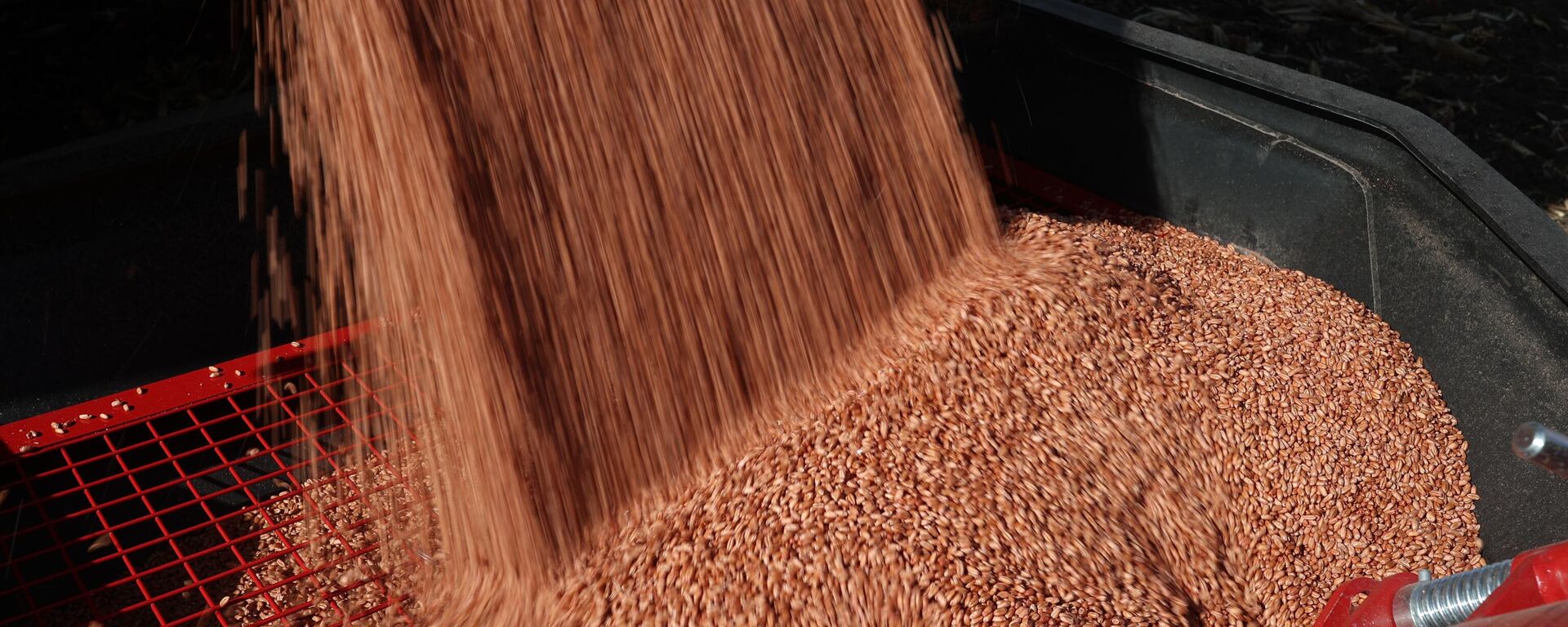https://sputnikglobe.com/20240531/massive-tariffs-on-russian-and-belarussian-grain-imports-will-hurt-eu-farmers-1118715547.html
Massive Tariffs on Russian and Belorussian Grain Imports Will Hurt EU Farmers
Massive Tariffs on Russian and Belorussian Grain Imports Will Hurt EU Farmers
Sputnik International
The EU's prohibitive tariffs on grain products from Russia and Belarus will only hurt the bloc's own farmers, as preferential supplies from Ukraine continue, Arkady Zlochevsky, Russian Grain Union President, told Sputnik.
2024-05-31T15:40+0000
2024-05-31T15:40+0000
2024-05-31T17:51+0000
analysis
russia
grain
belarus
tariffs
ukraine crisis
arkady zlochevsky
russian grain union
european union (eu)
ukraine
https://cdn1.img.sputnikglobe.com/img/07e6/09/0a/1100633252_0:159:3078:1890_1920x0_80_0_0_9a6221e13ee15486cd0dfc78f8f64a01.jpg
The EU decision to levy prohibitive tariffs on grain products from Russia and Belarus is nothing but a smokescreen, while the bloc’s own farmers shall continue to suffer from continued preferential supplies from Ukraine, Russian Grain Union President Arkady Zlochevsky told Sputnik.Brussels’ officials are "making the best of a bad business," he noted, wanting to be seen as trying to limit the negative impact of EU-mandated Ukrainian grain dumping on farmers in Central and Eastern Europe.“So they will kill off our [Russia's] direct supplies, which never affected farmers' sales," he stressed. But as Ukrainian low-cost, duty-free grain will continue to saturate the EU market, it will further depress prices for local farmers.Amid widespread protests by farmers that have raged since the EU-Ukraine preferential trade regime was adopted, Brussels is suggesting these new tariffs will alleviate farmers' grievances, said the expert."Russia, by definition, has never engaged in dumping in Europe," he added.He also pointed out that while durum wheat — used to make spaghetti and other pasta — were a major part of Russian exports to the EU, it was oilseeds that accounted for the main bulk and cost of imports.Zlochevsky argued that the tariffs “will not have much effect on world prices,” adding that the EU will continue to buy the products from other sources, such as Canada. Farmers in countries including Poland, Romania, Bulgaria and Slovakia have suffered from the glut in Ukrainian grain. The grain expert said the new EU measures against Russia and Belarus will fall wide of the mark."All that was needed was to level out the terms for the supply of Ukrainian and all other grain to the European market," noted the pundit. "Introducing the same duties, quotas, etc.” The European commission's proposal to raise tariffs on Russian and Belarussian exports of cereals, oilseeds and derived products like vegetable oil to the bloc were unveiled in the wake of the EU summit on March 21 and 22.The tariff hike from zero to swingeing levels was imposed despite Russian cereals only making up a small share of total EU imports.Cereals transiting through the EU to other regions, such as North Africa, would be exempt from the measures, European commissioners said, claiming that would prevent the tariffs from undermining global food security,Zlochevsky told Sputnik at the time that officials in Brussels would be “shooting themselves in the foot” by imposing the tariffs.He added that the EU backing for Ukraine will continue to backfire on the bloc's farmers.Russian Foreign Ministry spokeswoman Maria Zakharova responded to the EU proposal by warning the measures will only worsen the world food situation."Is this her way of worrying about starving countries? How will such measures contribute to world food security? They will not. They will only exacerbate the world food situation already brought to absurdity by the West," Zakharova wrote on Telegram.The EU now accounts for just two percent of Russia’s global grain exports, Russian agricultural market research firm SovEcon has estimated. Eurostat figures show that Ukraine, accounts for a much larger share of the bloc's imports.Russia's export volumes can be easily redirected to more promising markets such as the Middle East and Africa, experts have told Sputnik.
https://sputnikglobe.com/20240322/raising-eu-tariffs-on-russian-belarusian-grain-to-aggravate-world-food-situation---moscow-1117481059.html
https://sputnikglobe.com/20240320/eu-will-shoot-itself-in-the-foot-with-tariffs-on-russia-belarus-grain-imports-1117449809.html
https://sputnikglobe.com/20240524/russias-share-in-global-wheat-export-to-surpass-25-in-2024-1118617085.html
russia
belarus
ukraine
Sputnik International
feedback@sputniknews.com
+74956456601
MIA „Rossiya Segodnya“
2024
News
en_EN
Sputnik International
feedback@sputniknews.com
+74956456601
MIA „Rossiya Segodnya“
Sputnik International
feedback@sputniknews.com
+74956456601
MIA „Rossiya Segodnya“
eu tariffs on grain from russia, belarus, brussels to levy tariffs on grain imports from russia and belarus, grain disputes with poland, russia's grain exports, russia's wheat exports, eu prohibitive tariffs on russia's grain, tariffs on russian wheat, agricultural products, global grain trade, world grain exports, grain export forecast, international grains council, grain market report, grain exports, agricultural season, tons of grain, the world food situation, what is the world food situation,
eu tariffs on grain from russia, belarus, brussels to levy tariffs on grain imports from russia and belarus, grain disputes with poland, russia's grain exports, russia's wheat exports, eu prohibitive tariffs on russia's grain, tariffs on russian wheat, agricultural products, global grain trade, world grain exports, grain export forecast, international grains council, grain market report, grain exports, agricultural season, tons of grain, the world food situation, what is the world food situation,
Massive Tariffs on Russian and Belorussian Grain Imports Will Hurt EU Farmers
15:40 GMT 31.05.2024 (Updated: 17:51 GMT 31.05.2024) The European Commission presented formal proposals in March on the restriction of grain and seed oil from Russia and Belarus, ostensibly aimed at avoiding “destabilizing” the European Union (EU) market, while also seeking to deprive Russia of revenues from trade with the bloc.
The EU decision to levy
prohibitive tariffs on grain products from Russia and Belarus is nothing but a smokescreen, while the bloc’s own farmers shall continue to suffer from continued
preferential supplies from Ukraine, Russian Grain Union President
Arkady Zlochevsky told
Sputnik.
Brussels’ officials are "
making the best of a bad business," he noted, wanting to be seen as trying to limit the negative impact of EU-mandated
Ukrainian grain dumping on farmers in Central and Eastern Europe.
“So they will kill off our [Russia's] direct supplies, which never affected farmers' sales," he stressed.
But as Ukrainian low-cost, duty-free grain will continue to saturate the EU market, it will further depress prices for local farmers.
Amid
widespread protests by farmers that have raged since the EU-Ukraine preferential trade regime was adopted, Brussels is suggesting these new tariffs will alleviate farmers' grievances, said the expert.
“But we [Russia] are not the ones putting pressure on farmers’ sales in Europe," Zlochevsky pointed out. "Ukrainian supplies are.”
"Russia, by definition, has never engaged in dumping in Europe," he added.
He also pointed out that while durum wheat — used to make spaghetti and other pasta — were a major part of Russian exports to the EU, it was oilseeds that accounted for the main bulk and cost of imports.
“Now, accordingly, they will look for workaround routes," he noted. "Surely they will find them, say, via Turkiye, only they will be more expensive.”
The EU trade ministers agreed on Thursday to slap tariffs on grain and other agricultural products from the two countries as of July 1. The tariffs will be €95 ($103) per ton for cereals, and 50 percent of their value for oilseeds. Tariffs are to apply to beet-pulp pellets and dried peas as well. The tariffs were conceived to stop imports of grain from Russia and Belarus into the EU “in practice,” according to Vincent Van Peteghem, the finance minister of Belgium. “These measures will, therefore, prevent the destabilization of the EU’s grain market,” he said.
Zlochevsky argued that the tariffs “will not have much effect on world prices,” adding that the EU will continue to buy the products from other sources, such as Canada.
Farmers in countries including Poland, Romania, Bulgaria and Slovakia have suffered from the glut in Ukrainian grain. The grain expert said the new EU measures against Russia and Belarus will fall wide of the mark.
“Will the measure to stop imports of Russian grain help them? Of course not. If they choked off Ukrainian grain in the same way, it might help," Zlochevsky said. "But all prohibitions tend to have a negative effect and do not work effectively."
"All that was needed was to level out the terms for the supply of Ukrainian and all other grain to the European market," noted the pundit. "Introducing the same duties, quotas, etc.”
The European commission's proposal to raise tariffs on Russian and Belarussian exports of cereals, oilseeds and derived products like vegetable oil to the bloc were unveiled in the wake of the EU summit on March 21 and 22.
The tariff hike from zero to swingeing levels was imposed despite Russian cereals only making up a small share of total EU imports.
Cereals transiting through the EU to other regions, such as North Africa, would be exempt from the measures, European commissioners said, claiming that would prevent the tariffs from undermining global food security,
Zlochevsky
told Sputnik at the time that officials in Brussels would be “
shooting themselves in the foot” by imposing the tariffs.
“In effect, they will create complications for their own consumers, and not for us; they [grain tariffs] will not really affect us,” he said.
He added that the EU backing for Ukraine will continue to
backfire on the bloc's farmers.
Russian Foreign Ministry spokeswoman Maria Zakharova responded to the EU proposal by warning the measures will only worsen the world food situation.
"Is this her way of worrying about starving countries? How will such measures contribute to world food security? They will not. They will only exacerbate the world food situation already brought to absurdity by the West," Zakharova wrote on Telegram.
The EU now accounts for just
two percent of Russia’s global grain exports, Russian agricultural market research firm SovEcon
has estimated.
Eurostat figures show that Ukraine, accounts for a much larger share of the bloc's imports.
Russia's export volumes can be easily redirected to more promising markets such as the Middle East and Africa,
experts have told Sputnik.Russia is set to export up to 70 million tons of grain, including around 53 million tons of wheat, in the current agricultural season from July 1, 2023, to June 30, 2024, Vice-Prime Minister Dmitry Patrushev announced at the All-Russian Grain Forum. In its Grain Market Report, the International Grains Council (IGC) increased its forecast of Russian wheat exports by 1 million tons to a record 53.1 million. That means Russia will occupy close to 26 percent of the market for the first time in history.




